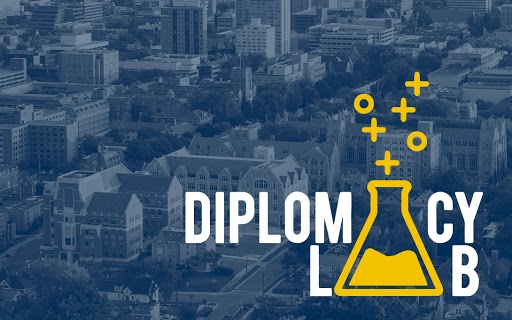
Disinformation in sub-Saharan Africa, money laundering in the Western Hemisphere, space diplomacy, China’s domestic drug problem and international hostage negotiation are real-world issues that students will explore as the Ford School’s Weiser Diplomacy Center (WDC) inaugurates its participation in the U.S. State Department’s Diplomacy Lab (DipLab) program.
The State Department’s Office of Global Partnerships (OGP) works with university partners around the country to engage students to help tackle pressing, policy-relevant questions posed by active State Department officials. WDC serves as U-M’s administrative hub for the program.
Last spring, interested students from the Ford School and the U-M Law School formed groups of 4-to-6 people, found a willing faculty advisor, and made bids for the research projects. OGP ran a matching process in which the officials who posed the research questions reviewed the bids and selected the Ford School teams. They will have access to the State Department officials throughout the semester as they conduct research and prepare their final reports, including preparing policy memos that include relevant qualitative and/or quantitative data.
“This is a great opportunity for undergraduate and graduate students to understand the complexities of international diplomacy on a truly practical level,” says John Ciorciari, WDC faculty director. “Through working with our own faculty experts as well as their State Department contacts, they will be able to do deep dives into real-world issues.”
The faculty advisors for the Fall 2020 semester include Towsley Policymaker in Residence Javed Ali, economics professor Kathryn Dominguez, and professor of international policy and practice and WDC senior advisor Melvyn Levitsky.
During Levitsky’s 35-year career as a diplomat, in addition to stints as ambassador to Bulgaria and Brazil, he served as Assistant Secretary of State for International Narcotics Matters. He is advising on the DipLab project related to drug control in China. “I also teach a course in Global Issues: Drugs, Crime and Terrorism. The project in which they are involved will assist the Department of State in devising effective approaches to China's drug policies. With my background, I have a kind of natural fit with the work of these students,” he says.
Ali says, “The work has real-world implications for the State Department stakeholders. Helping to facilitate briefings, review materials, and oversee timelines are hopefully practical insights the faculty advisors can bring to student teams. This process has value far outside the classroom."
“The project will involve a comparative analysis of existing anti-money laundering legislation across the Western Hemisphere. We are working with a fantastic person at the State Department (who agreed to put aside the rivalry that her years in East Lansing instilled in her for this project) and we are fast becoming (anti) money laundering experts," says Dominguez. “The students will have the opportunity to present their research findings at the end of this semester to experts in this field at the State Department, U.S. Treasury, and the Department of Justice”.
Established in 2013, the Diplomacy Lab lists its pillars as “Engagement” and “Education,” allowing “policymakers to tap into an underutilized reservoir of intellectual capacity” and “contributing to the Secretary’s public diplomacy goals.”
More news from the Ford School